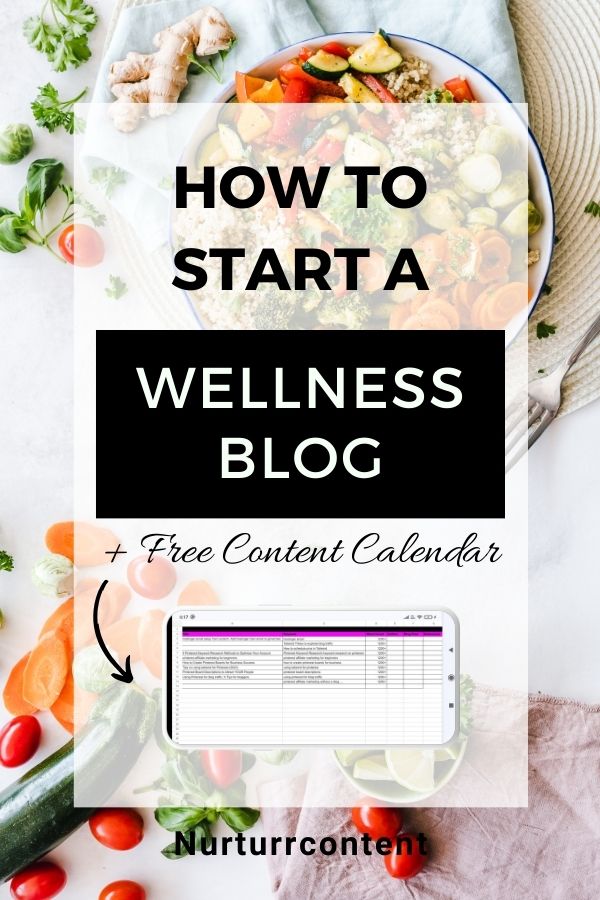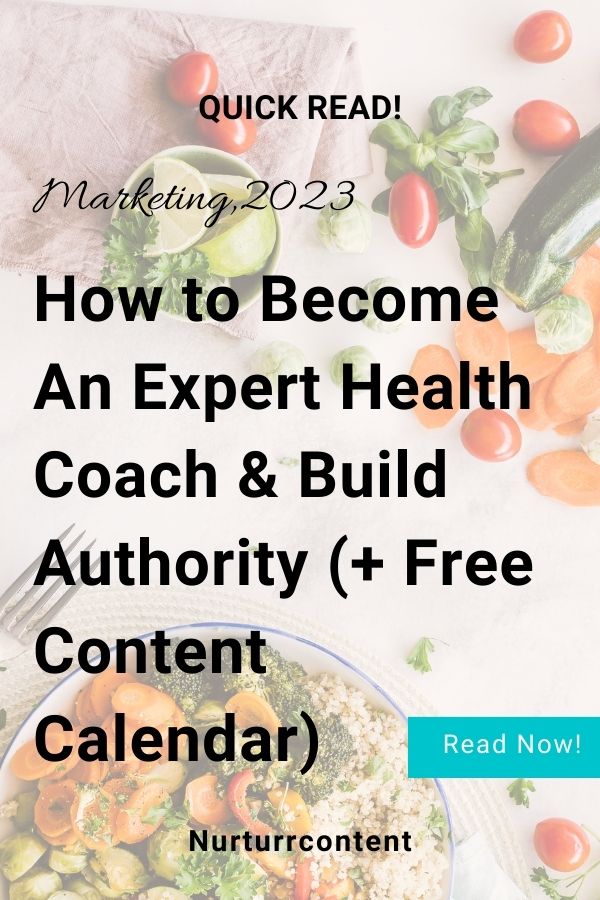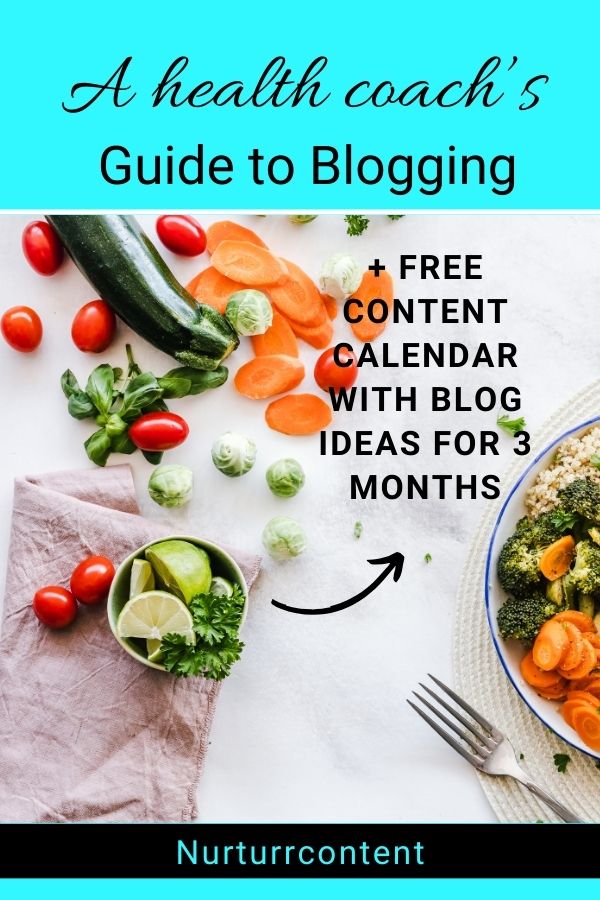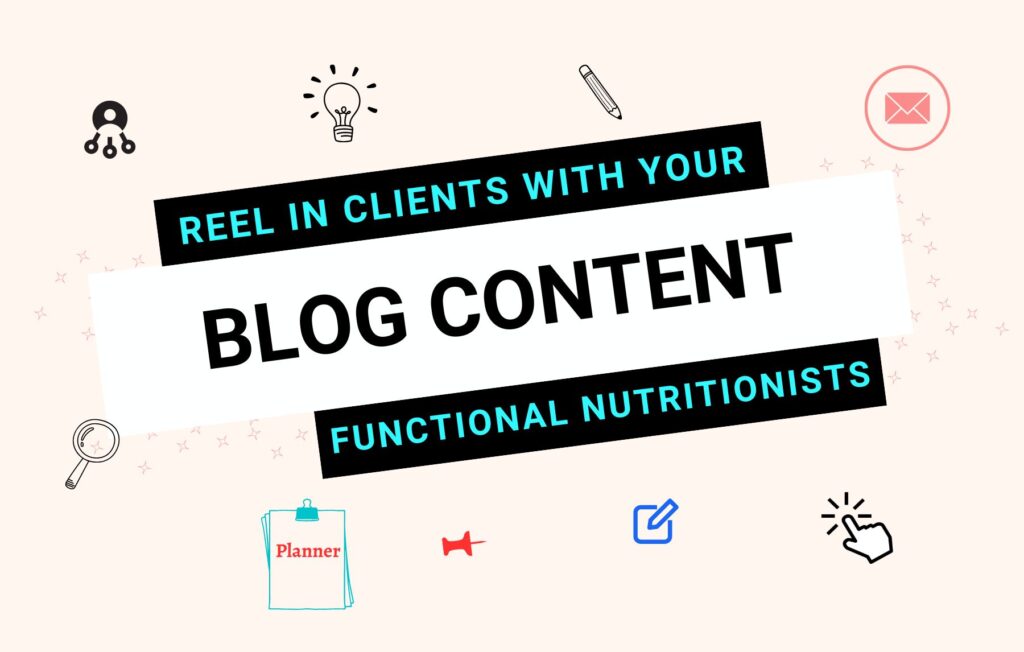In the ever-evolving world of health and wellness, health coaching has emerged as a vital practice for anyone seeking guidance and support in achieving their well-being goals. As this industry grows, you as a health coach need to adapt your strategies to stand out in this competitive market. How about starting with a Functional Nutrition blog?
One powerful tool, which is rarely used among health coaches, is blogging. Blogging offers so many advantages, ranging from improving SEO to building a strong brand identity and expanding your audience.
In this beginner’s guide, we’ll go through what exactly a wellness blogger is and how to use your functional nutrition blog to get your dream clients to book sessions with you.
What Is A Functional Nutrition Blogger?
A Functional Nutrition blogger is someone who shares tips, advice, and expertly written articles related to various aspects of health, functional nutrition, and overall lifestyle.
Functional nutrition bloggers inspire and educate their audience about leading a healthier and more balanced life through:
- healthy recipes
- workout routines
- meditation techniques
- mindfulness practices
- stress management
- natural remedies
- and more
How Do I Start A Functional Nutrition blog?
So many health coaches miss the mark when it comes to starting a meaningful blog that will get results in terms of leads, bookings, and engagement.
Setting up a website and starting a wellness blog involves several key steps:
- Choose your niche
- Select a blogging platform
- Domain name and hosting
- Design your blog
- Create and edit your main pages
Choose Your Niche
Define the specific focus of your functional nutrition blog. Be as specific as you can, for example, functional nutrition coaching, mental health coaching, gut health, and weight loss coaching. Getting this step right will make content creation a whole lot easier.
Select A Blogging Platform
Choose a blogging platform that suits your needs and technical expertise. Popular options include WordPress, Squarespace, and Wix.
Domain Name And Hosting
Select a unique and memorable domain name that reflects your blog’s niche (like dietwithsarah.abc or yourbizcoach.abc). Get a fast and reliable hosting service to make your blog accessible on the internet.
Design Your Blog
Create an aesthetically pleasing and user-friendly website. You can use Astra starter templates which give you a predesigned fully functional, mobile-friendly template theme for your WordPress website.
Create And Edit Your Main Pages
Customize your About, Home, Services, Contact, and Testimonials page. These pages need to be optimized with SEO and compelling copy to really capture prospects’ attention and get them to click your CTAs. That’s why it’s important to get your health copywriting done professionally.
Pin for later!

**Grab a free 3-month content calendar with blog ideas tailored to your brand**
How Do You Write A Nutrition Blog?
Writing a functional nutrition blog post requires a blend of expertise, research, and a passion for helping others make healthier food choices. Here are some steps to guide you:
- Research and stay informed
- Know who this blog post targets
- Address common nutrition concerns
- Provide evidence-based information
- Have a simple format
- Include visuals
- Link out to relevant resources
- Include a CTA
Research and Stay Informed
Stay updated with the latest nutrition trends, news, and guidelines, and create blog post ideas around those topics.
Know Who This Blog Post Targets
Although your website is related to a specific niche, your blog posts may target different people within that niche. For example, a keto health coach can write the following blog posts related to keto, but they target different types of people:
- Can the keto diet be used to manage diabetes? (For people with diabetes)
- Healthy fats for bodybuilding (For people who want to build muscle)
- Best keto-friendly meal plan for weight loss (For people who want to lose weight)
By knowing exactly who you’re writing for, you can tap into the needs, wants, and fears of your audience and make your blog post really speak to them.
Address Common Nutrition Concerns
When crafting your blog post outline, make sure to really delve into the topic so that the person who reads that article doesn’t need to click on another site (in SERPs) for more information.
I know I’ve sometimes clicked on 3-4 articles on Google’s first page because I couldn’t find adequate information on a topic.
Solution: Type your keyword/topic into Google and find related questions to use as headings (H2, H3,…) in your article. Questions that aren’t closely related to the topic can be answered in the FAQ section.
Provide Evidence-Based Information
Back up your claims and recommendations with credible sources, such as peer-reviewed studies, government health organizations, or registered dietitians.
Have A Simple Format
Your article should be structured in a way that makes it easy to read, with headings, lists, and short paragraphs.
Include Visuals
Use images, charts, and infographics to enhance your content and make it visually appealing.
Link Out To Relevant Resources
Include links in your blog post to boost SEO. There are two types of links, namely:
Internal – These link out to articles or content on your site
External – These link out to articles, statistics, and resources on other sites
Include A CTA
Encourage readers to book a call with you, sign up for your email list, or leave a comment.
Pin for later!

**Grab a free 3-month content calendar with blog ideas tailored to your brand**
How Do You Create Nutrition Content?
By planning a content strategy, you can establish yourself as a reputable source of nutrition information and attract a loyal readership to your wellness blog. Here are some tips for creating share-worthy nutrition content:
- Choose a topic
- Do keyword research
- Craft a compelling headline
- Create an editorial calendar
Choose A Topic
Research industry trends and evergreen topics relevant to your target audience and align with your blog’s niche.
Do Keyword Research
When you have 2-3 topics, find low-competition keywords related to those topics. For each topic get at least 10 long-tail keywords so you can write 10 blog posts on each topic.
Scenario: A keto health coaching blog can have the following topics and corresponding articles:
Topic 1: keto for diabetics
Articles:
- Can the keto diet be used to manage diabetes?
- Carbs vs sugar: What you need to know
- Should diabetics avoid all sugars
Topic 2: keto diet for fitness
Articles:
- Healthy fats for bodybuilding
- Keto fitness meal plan
- Best keto-friendly protein shakes
Topic 3: keto weight loss recipes
Articles:
- Best keto-friendly meal plan for weight loss
- Low-carb desserts for this summer
- 23 super fudgy keto brownie recipes you need to try!
Craft A Compelling Headline
If you’re wondering: ‘How do I choose a good blog post title?’ Your blog title should do two things: grab attention and give the reader a reason to click on it.
To captivate readers, use statistics, numbers, or mention something related to the needs and desires of your target audience, as shown below:
- 33% of diabetics achieved __ on the keto diet
- 3 Easy ways to cut down on carbs
- 7 Quick keto breakfasts for busy moms
Create An Editorial Calendar
Now that you’ve got your keywords and possible titles, put them in a content calendar and add [dates for] when you want them published. Consistency is essential in blogging, so establish a regular posting schedule.
The editorial calendar typically includes the word count, main keywords, headline, etc.
Why Blogging Is Good For Health Coaches
Here are a few ways blogging can contribute to your marketing strategy:
- Blogging improves your health coaching website’s SEO
- Sharing wellness expertise helps establish you as an industry expert
- Blogging communicates your health coaching voice + brand
- Content marketing grows your health coaching audience
Blogging Improves Your Health Coaching Website’s SEO
Blogging helps boost your entire website’s SEO in the following ways:
- Search engines will rank your blog higher in search results if you regularly publish fresh content, making it easier for people to find you.
- Consistently blogging increases website traffic, lowers bounce rates, and adds more and more keywords to your website for search engines to crawl.
- Each new article adds more content, titles, and keywords to your site. Allowing search bots to better understand the content you provide and send more search traffic your way.
- A blog archive can keep visitors on your website longer. When people spend time roaming your website it shows that people find your content useful…which also helps SEO.
- Blogging is great for making use of long-tail keywords, which are multiple keywords strung together. This is important for SEO as they tend to be more specific and have less competition.
- Promotes internal linking throughout your website.
- Blog posts provide more opportunities for other sites to link back to your health coaching website, thereby building your authority.
Sharing Wellness Expertise Helps Establish You As An Industry Expert
When sharing your expertise through blog posts, you’re positioning yourself as an expert. People are more likely to trust and acknowledge you if you show a deep understanding of your field through your blog – this greatly benefits new health coaches who want exposure through online marketing.
Only share health content that your target coaching audience would find useful. Content should also be relevant to the services or products you offer like consultations, courses, or other products.
Blogging Communicates Your Health Coaching Voice + Brand
What makes your brand different from the rest? Tap into that… differentiating your health coaching brand is essential when marketing your business.
Blogging gives you a platform to showcase your unique voice, values, and approach to wellness coaching. This way you can attract like-minded individuals who get you, and you’ll also enjoy working with them because they understand and resonate with your brand’s mission and values.
Content Marketing Grows Your Health Coaching Audience
Using blogging as part of your content marketing strategy gives you the ability to expand your health coaching audience significantly. As content marketing extends your reach beyond the blog itself.
A blog post can be repurposed into other formats, such as:
- Videos
- Infographics
- podcasts
- Quora answers
- Social media posts
Valuable blog posts get shared on social media, bookmarked, and referenced in other publications.
Engaging with people through comments, emails, or social media, helps you build a loyal and supportive community. Which can ultimately lead to long-term client relationships for your health coaching business.
How To Share Your Functional Nutrition Content As A Health Coaching Expert
Sharing content goes beyond your website. Utilize various platforms and strategies to extend your reach and attract a wider audience, such as:
- Social media
- Email marketing
- Webinars and workshops
- Collaborate with influencers
- Podcasts and videos
Social Media
Leverage social media platforms like Instagram, Facebook, Pinterest, and LinkedIn to share bite-sized nutrition tips, recipe ideas, and links to your blog posts. Engage with your followers by responding to comments and questions promptly.
Email Marketing
Build an email list by offering freebies such as checklists, ebooks, or something your target audience would need that’s related to your niche. Send out newsletters to your email list regularly, informing them about new blog posts or any promotions.
Webinars and Workshops
Another way to get people on your email list is to have them sign up to watch a free webinar, this drastically increases the conversion rate for high ticket offers.
This interactive approach allows you to showcase your expertise and connect directly with leads, after which you can send a series of emails promoting your offer.
>>Build evergreen webinars with Systeme.io for as low as $47/month. Includes free migration 😀<<
Collaborate with Influencers
Partner with influencers or other health experts in the industry to co-create content or participate in interviews. This cross-promotion can introduce your health coaching expertise to new audiences.
Podcasts and Videos
Consider starting a podcast where you discuss topics in-depth or a YouTube channel to create healthy recipes. Multimedia content appeals to different learning preferences and attracts more followers.
Blog Posts Health Coaches Should Be Writing
Blogging can be used to build connections, provide information, promote affiliate links, and much more. Here are a few types of blog posts you need as a health coach:
- The checklist
- A How-to guide
- Your personal story
- Success stories or testimonials
- Listicles
- Link roundups
- An interview
- The infographic post
- A beginner’s guide
The Checklist
A checklist-style blog post can be used to help readers get something done, such as a fitness challenge. To create this type of post, break the challenge down into small actionable steps that can easily be ticked off.
A How-to Guide
How-to guides provide all the information you need to complete a task, such as recipes, and fitness or meditation routines. This is especially helpful to beginners who are new to a specific task.
Your Personal Story
Incorporating your story or how you overcame a setback into a blog post makes you relatable to readers who might be facing similar struggles. Being a little vulnerable helps you connect with your audience on a deeper level.
Success Stories Or Testimonials
Social proof not only shows your experience but also tells the world how awesome you are at what you do. A blog post based on a success story features only one client and tells about their challenges and how you helped them achieve their health goals.
If you’re writing a blog post solely to educate people about your service or course, add in some testimonials from past clients… Most of us need to read reviews before spending money.
Listicles
List posts are fun, easy to read, and do well for SEO. List posts can be in the form of tips, guides, top 10 __, etc. It could be a list of ‘Top 15 almond brownie recipes’, or ‘Best leg workouts to do while sitting’.
Link Roundups
With a roundup post, you can include links to recipes, videos, blog posts, and other resources on a particular topic instead of writing a lengthy post.
To gain more shareability, link out to offers or content from other creators in your niche. Send them an email mentioning that you included their offers in your roundup post and ask if they would share it on their social media.
An Interview
If you want someone’s take on a topic, you can interview them and turn it into a blog post. Or turn your podcast episode into a Q&A blog post.
The Infographic Post
Infographics are much easier to read and do well on social media as they are colorful and most of all… a quick read. You can make an infographic for free on Canva, then create a new blog post with a short introduction and paste your image, and you’re done!
A Beginner’s Guide
Beginner guides are super helpful to new subscribers getting started with healthy living or a specific diet or lifestyle. For example, a Beginner’s Guide to calorie control, a Beginner’s Guide to keto substitutes, etc.
Final thoughts
Blogging is a powerful tool that offers numerous benefits to health coaching websites.
From enhancing SEO and establishing industry expertise to communicating your unique voice and building a community, blogging empowers health coaches to thrive in a competitive landscape.
By embracing blogging as an integral part of your marketing strategy, you’re taking a significant step toward achieving your goals and fulfilling your mission of guiding others toward a healthier and happier life.
Pin for later!

**Grab a free 3-month content calendar with blog ideas tailored to your brand**
Functional Nutrition Blog FAQs
What’s Your Favorite Website Platform For Starting A Wellness Blog?
I use WordPress.org with Hostinger. In terms of performance, flexibility, and pricing the Hostinger plans, and has a one-click WordPress install, making it simple for beginners to start blogging.
How Many Blog Posts Should I Have To Launch My Wellness Blog?
Have at least 10-15 blog posts on your website when you launch it. This makes your blog seem full and active to anyone who lands on your website.
After your launch, you need to release content on a regular basis, whether that’s weekly, bi-weekly, or monthly.
How Long Should My Blog Posts Be?
Check the length of the first few articles that appear in SERPs for your ‘target’ keyword, write something of similar length or longer. Ideally, write at least 1000-1200 words.
How Frequently Should I Post On My Wellness Blog?
If you really want to benefit from SEO then publish content 2-4 times a week. Even publishing once a week is fine as long as you’re consistent.
How Do I Sell Myself As A Life Coach?
If you want to successfully market yourself as a life coach, you need to reflect your authentic self in your branding.
Don’t make false promises or try to be anyone’s savior, just focus on what you can do and what results you bring your clients.
Build relationships through social media, networking, and your website. Simply get out there and people will come to you!
What Should I Write About?
As a health coach, you can write on:
- Current trends related to your niche
- Your own experience regarding a topic, this is a great way to connect with prospects
- Answer common questions you get from clients in a blog post
- Review nutritional or fitness products
How Do I Market Myself As A Nutrition Coach?
To land more clients as a nutrition coach, you need to:
- Know the needs, fears, and desires of your dream clients
- Practice your elevator pitch aka who you are and how you can help them
- Build connections and get your first client
- Get testimonials and place them on your website
- Ask for referrals from your clients
How Do I Start A Sustainable Blog?
To have a blog that guarantees long-term success, you need these 3 key things:
- Identify your niche and your unique selling point (USP)
- A professional domain name and hosting for your website
- A blog content calendar (get a free custom calendar here)
Sharing valuable functional nutrition blog content is a powerful way to establish yourself as an expert health coach and build your brand.
I hope you enjoyed this guide on how to share your functional nutrition blog content effectively. Do you have any little-known ways of attracting clients as a health coach? Comment down below!

